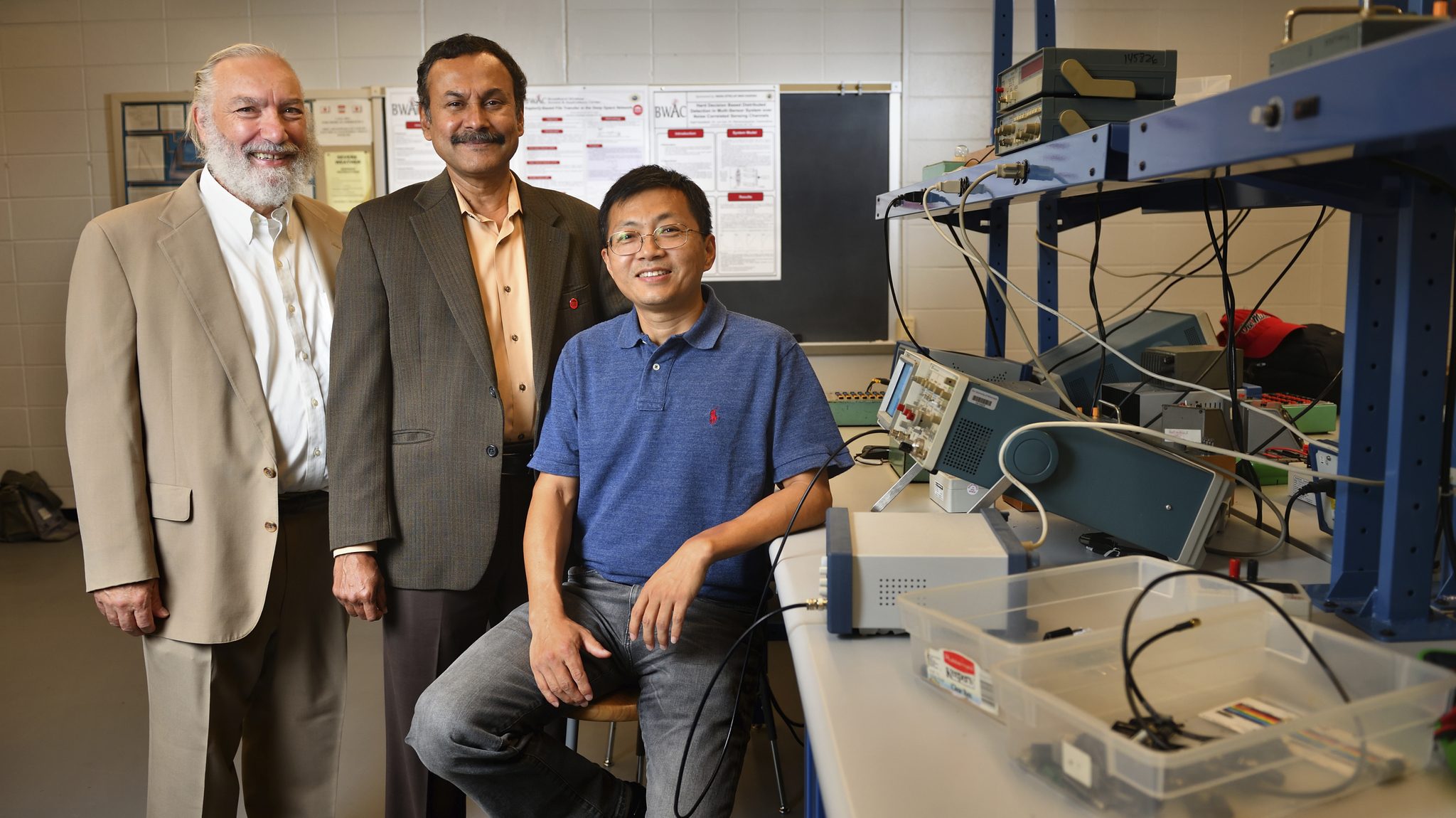
A prolific researcher, Lei Cao (right) has collaborated with fellow UM electrical engineering colleagues John Daigle and Ramanarayanan ‘Dr. Vish’ Viswanathan. Photo by Robert Jordan/Ole Miss Digital Imaging Services
When Lei Cao joined the faculty in the University of Mississippi’s Department of Electrical Engineering, his focus was to give his best in teaching and research. Seventeen years of committed instruction and unwavering dedication later, the professor of electrical engineering was named the 2018 Outstanding Engineering Faculty Member of the Year.
“The day before the Engineering Honors Banquet, I received a call from ex-Dean Alexander Cheng requesting my attendance,” said Cao, who also received the Senior Faculty Research Award in 2016. “I was both shocked and delighted since there are so many excellent professors in the School of Engineering who get their work done with maximum efforts and the highest standards. This honor recognizes both teaching and research, which I value most and equally.”
With almost two decades of experience in academic research and teaching at universities (including the University of Science and Technology of China), Cao said his philosophy of instruction is twofold. First, he believes in linking courses in the curriculum and real-world applications. Second, Cao promotes critical thinking and active learning with questions and discussions in classes and seminars.
Since he joined UM, Cao has taught a dozen different courses. Among these, two he developed himself.
“The Digital Signal Processing and Information Theory are completely new,” Cao said. “EL E 415 (Telecommunications Lab) is also a new design using different instruments and experiments. I’m still teaching all these courses regularly depending on the schedule of the department.”
Cao previously worked with Symbol Technologies Inc. in New York and Mitsubishi Electric Research Laboratories in New Jersey as an intern and research associate. His research interests include image processing and digital signal processing for wireless communications.
“The nature of the work can be understood from the projects I am working on with some colleagues,” he said. “In the NASA EPSCoR project titled ‘A New Paradigm for Efficient Space Communications,’ we aim to improve the deep-space communications, such as between Mars and Earth.”
The main challenge facing the team is the delays between the time that signals are sent and then received. For example, a delay between the two aforementioned planets can last anywhere from two to 24 minutes.
“This large latency makes the retransmission unrealistic when some data are not received correctly,” Cao said. “Through this project, we have developed new data coding and fusion techniques, and new content delivery protocols that can transmit data efficiently and reliably.”
In addition, eight undergraduate students also have been supported through this project to gain hands-on experience. Their work has resulted in an oral presentation at the 31st National Conference on Undergraduate Research and an article published in the University of Mississippi Undergraduate Research Journal.
Cao discussed two other research projects in which he is involved. A National Science Foundation Broadband Wireless Access & Applications Center project, “Spectrum Sensing and Channel Assignment for Coexistence of LTE and Wi-Fi Systems” addresses how the two forms of 5G wireless communications can co-exist.
“Since frequency spectrum is a limited resource for wireless communications, one enabling technology to provide more data service is to let the cellphone system and the Wi-Fi system have shared use of the same range of unlicensed band,” Cao said. “Each system can use the frequency band when the other is not using it. Our research concerns the spectrum sensing techniques and methods to improve overall system capacity while in the meantime keeping fairness between the different systems.”
In another project in collaboration with UM’s National Center for Physical Acoustics and sponsored by the Gulf Research Program, Cao uses the acoustic signals collected by a number of hydrophones located in different places to develop triangulation methods to pinpoint the positions when possible oil/gas leakages occur in the seafloor. Together, the researchers have already successfully tested a couple of techniques in an experimental environment.
Cao is a senior member of the Institute of Electrical and Electronics Engineers and a member of Sigma Xi. A prolific author with more than 100 technical publications in related areas, he has served on the editorial board of several journals and has served as a technical committee member and session chair for many leading international conferences. He is also an active reviewer for numerous IEEE journals, conferences and agencies.
A Chinese native, Cao earned his bachelor’s degree in electrical engineering from Hefei University of Technology in Anhui, China; a master’s degree in computer science from the University of Science and Technology of China and a Ph.D. in electrical engineering from the University of Missouri-Columbia.
He and his wife, Yu Wang, have two sons. He plays badminton and swims regularly.
“Lately, I’ve been learning to play piano from my sons, Leon and Kenneth,” Cao said. “I’m quite happy that I can play some simple songs now.”